英语论文-从英译汉的实例分析看英汉思维方式差异
- 格式:doc
- 大小:75.50 KB
- 文档页数:10
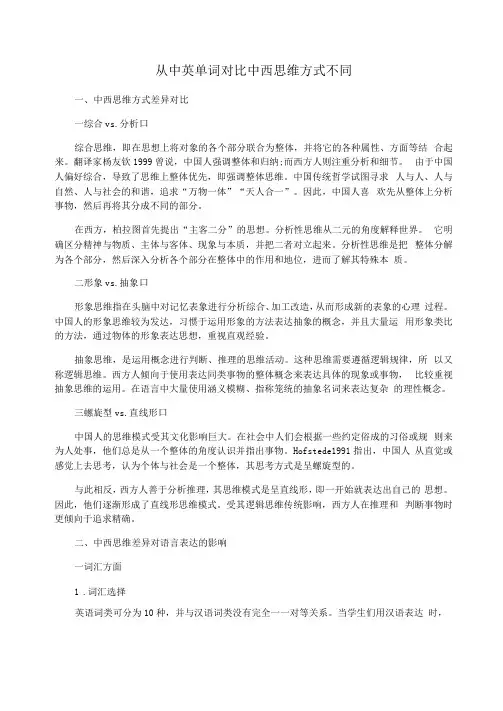
从中英单词对比中西思维方式不同一、中西思维方式差异对比一综合vs.分析口综合思维,即在思想上将对象的各个部分联合为整体,并将它的各种属性、方面等结合起来。
翻译家杨友钦1999曾说,中国人强调整体和归纳;而西方人则注重分析和细节。
由于中国人偏好综合,导致了思维上整体优先,即强调整体思维。
中国传统哲学试图寻求人与人、人与自然、人与社会的和谐,追求“万物一体”“天人合一”。
因此,中国人喜欢先从整体上分析事物,然后再将其分成不同的部分。
在西方,柏拉图首先提出“主客二分”的思想。
分析性思维从二元的角度解释世界。
它明确区分精神与物质、主体与客体、现象与本质,并把二者对立起来。
分析性思维是把整体分解为各个部分,然后深入分析各个部分在整体中的作用和地位,进而了解其特殊本质。
二形象vs.抽象口形象思维指在头脑中对记忆表象进行分析综合、加工改造,从而形成新的表象的心理过程。
中国人的形象思维较为发达,习惯于运用形象的方法表达抽象的概念,并且大量运用形象类比的方法,通过物体的形象表达思想,重视直观经验。
抽象思维,是运用概念进行判断、推理的思维活动。
这种思维需要遵循逻辑规律,所以又称逻辑思维。
西方人倾向于使用表达同类事物的整体概念来表达具体的现象或事物,比较重视抽象思维的运用。
在语言中大量使用涵义模糊、指称笼统的抽象名词来表达复杂的理性概念。
三螺旋型vs.直线形口中国人的思维模式受其文化影响巨大。
在社会中人们会根据一些约定俗成的习俗或规则来为人处事,他们总是从一个整体的角度认识并指出事物。
Hofstede1991指出,中国人从直觉或感觉上去思考,认为个体与社会是一个整体,其思考方式是呈螺旋型的。
与此相反,西方人善于分析推理,其思维模式是呈直线形,即一开始就表达出自己的思想。
因此,他们逐渐形成了直线形思维模式。
受其逻辑思维传统影响,西方人在推理和判断事物时更倾向于追求精确。
二、中西思维差异对语言表达的影响一词汇方面1.词汇选择英语词类可分为10种,并与汉语词类没有完全一一对等关系。
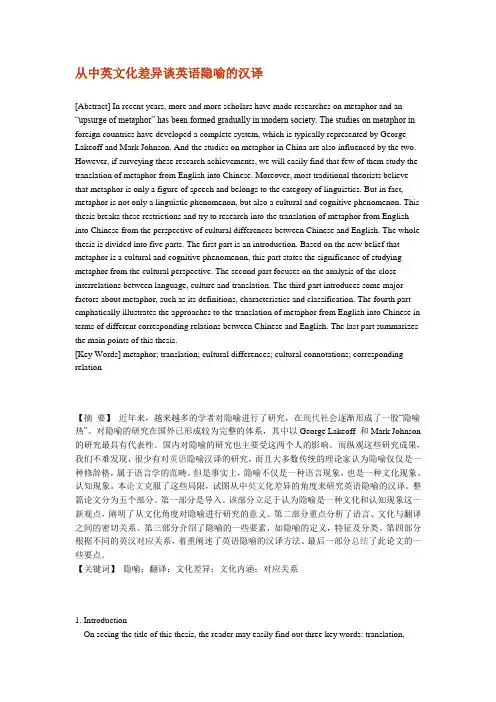
从中英文化差异谈英语隐喻的汉译[Abstract] In recent years, more and more scholars have made researches on metaphor and an “upsurge of metaphor” has been formed gradually in modern society. The studies on metaphor in foreign countries have developed a complete system, which is typically represented by George Lakeoff and Mark Johnson. And the studies on metaphor in China are also influenced by the two. However, if surveying these research achievements, we will easily find that few of them study the translation of metaphor from English into Chinese. Moreover, most traditional theorists believe that metaphor is only a figure of speech and belongs to the category of linguistics. But in fact, metaphor is not only a linguistic phenomenon, but also a cultural and cognitive phenomenon. This thesis breaks these restrictions and try to research into the translation of metaphor from English into Chinese from the perspective of cultural differences between Chinese and English. The whole thesis is divided into five parts. The first part is an introduction. Based on the new belief that metaphor is a cultural and cognitive phenomenon, this part states the significance of studying metaphor from the cultural perspective. The second part focuses on the analysis of the close interrelations between language, culture and translation. The third part introduces some major factors about metaphor, such as its definitions, characteristics and classification. The fourth part emphatically illustrates the approaches to the translation of metaphor from English into Chinese in terms of different corresponding relations between Chinese and English. The last part summarizes the main points of this thesis.[Key Words] metaphor; translation; cultural differences; cultural connotations; corresponding relation【摘要】近年来,越来越多的学者对隐喻进行了研究,在现代社会逐渐形成了一股“隐喻热”。
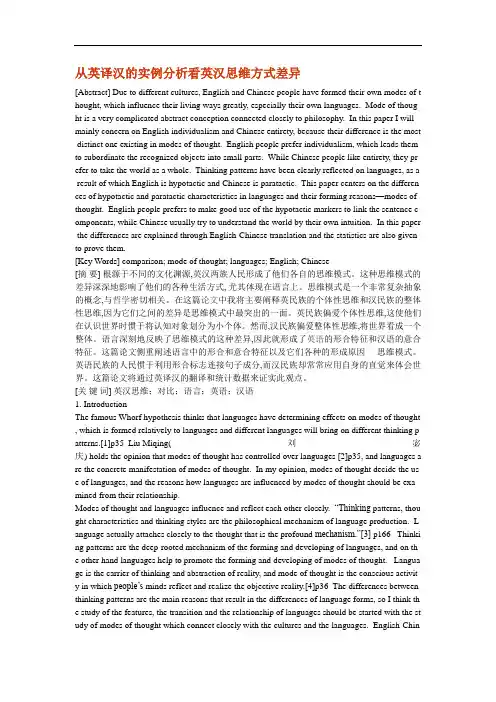
从英译汉的实例分析看英汉思维方式差异[Abstract] Due to different cultures, English and Chinese people have formed their own modes of t hought, which influence their living ways greatly, especially their own languages. Mode of thoug ht is a very complicated abstract conception connected closely to philosophy. In this paper I will mainly concern on English individualism and Chinese entirety, because their difference is the most distinct one existing in modes of thought. English people prefer individualism, which leads them to subordinate the recognized objects into small parts. While Chinese people like entirety, they pr efer to take the world as a whole. Thinking patterns have been clearly reflected on languages, as a result of which English is hypotactic and Chinese is paratactic. This paper centers on the differen ces of hypotactic and paratactic characteristics in languages and their forming reasons—modes of thought. English people prefers to make good use of the hypotactic markers to link the sentence c omponents, while Chinese usually try to understand the world by their own intuition. In this paper the differences are explained through English-Chinese translation and the statistics are also given to prove them.[Key Words] comparison; mode of thought; languages; English; Chinese[摘要] 根源于不同的文化渊源,英汉两族人民形成了他们各自的思维模式。
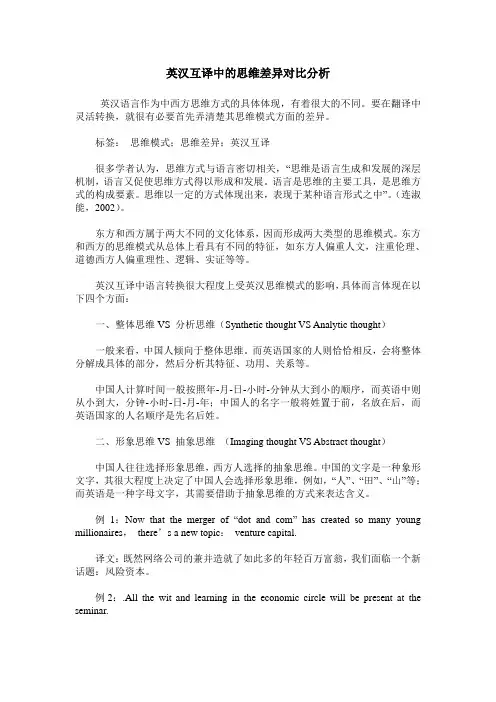
英汉互译中的思维差异对比分析英汉语言作为中西方思维方式的具体体现,有着很大的不同。
要在翻译中灵活转换,就很有必要首先弄清楚其思维模式方面的差异。
标签:思维模式;思维差异;英汉互译很多学者认为,思维方式与语言密切相关,“思维是语言生成和发展的深层机制,语言又促使思维方式得以形成和发展。
语言是思维的主要工具,是思维方式的构成要素。
思维以一定的方式体现出来,表现于某种语言形式之中”。
(连淑能,2002)。
东方和西方属于两大不同的文化体系,因而形成两大类型的思维模式。
东方和西方的思维模式从总体上看具有不同的特征,如东方人偏重人文,注重伦理、道德西方人偏重理性、逻辑、实证等等。
英汉互译中语言转换很大程度上受英汉思维模式的影响,具体而言体现在以下四个方面:一、整体思维VS 分析思维(Synthetic thought VS Analytic thought)一般来看,中国人倾向于整体思维。
而英语国家的人则恰恰相反,会将整体分解成具体的部分,然后分析其特征、功用、关系等。
中国人计算时间一般按照年-月-日-小时-分钟从大到小的顺序,而英语中则从小到大,分钟-小时-日-月-年;中国人的名字一般将姓置于前,名放在后,而英语国家的人名顺序是先名后姓。
二、形象思维VS 抽象思维(Imaging thought VS Abstract thought)中国人往往选择形象思维,西方人选择的抽象思维。
中国的文字是一种象形文字,其很大程度上决定了中国人会选择形象思维,例如,“人”、“田”、“山”等;而英语是一种字母文字,其需要借助于抽象思维的方式来表达含义。
例1:Now that the merger of “dot and com” has created so many young millionaires,there’s a new topic:venture capital.译文:既然网络公司的兼并造就了如此多的年轻百万富翁,我们面临一个新话题:风险资本。
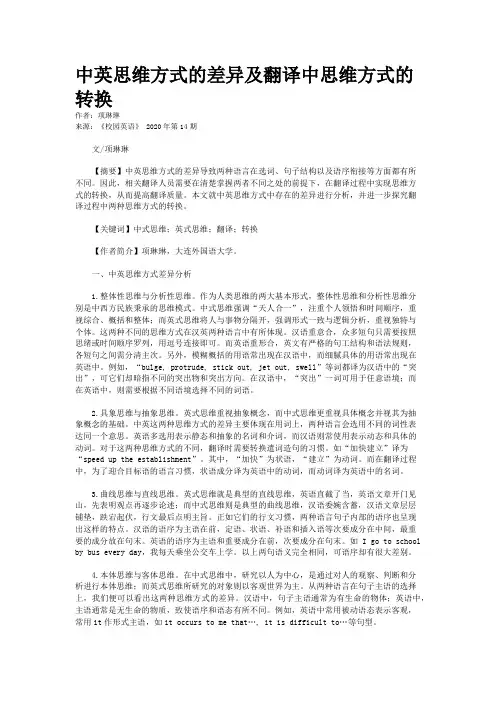
中英思维方式的差异及翻译中思维方式的转换作者:项琳琳来源:《校园英语》 2020年第14期文/项琳琳【摘要】中英思维方式的差异导致两种语言在选词、句子结构以及语序衔接等方面都有所不同。
因此,相关翻译人员需要在清楚掌握两者不同之处的前提下,在翻译过程中实现思维方式的转换,从而提高翻译质量。
本文就中英思维方式中存在的差异进行分析,并进一步探究翻译过程中两种思维方式的转换。
【关键词】中式思维;英式思维;翻译;转换【作者简介】项琳琳,大连外国语大学。
一、中英思维方式差异分析1.整体性思维与分析性思维。
作为人类思维的两大基本形式,整体性思维和分析性思维分别是中西方民族秉承的思维模式。
中式思维强调“天人合一”,注重个人领悟和时间顺序,重视综合、概括和整体;而英式思维将人与事物分隔开,强调形式一致与逻辑分析,重视独特与个体。
这两种不同的思维方式在汉英两种语言中有所体现。
汉语重意合,众多短句只需要按照思绪或时间顺序罗列,用逗号连接即可。
而英语重形合,英文有严格的句工结构和语法规则,各短句之间需分清主次。
另外,模糊概括的用语常出现在汉语中,而细腻具体的用语常出现在英语中。
例如,“bulge, protrude, stick out, jet out, swell”等词都译为汉语中的“突出”,可它们却暗指不同的突出物和突出方向。
在汉语中,“突出”一词可用于任意语境;而在英语中,则需要根据不同语境选择不同的词语。
2.具象思维与抽象思维。
英式思维重视抽象概念,而中式思维更重视具体概念并视其为抽象概念的基础。
中英这两种思维方式的差异主要体现在用词上,两种语言会选用不同的词性表达同一个意思。
英语多选用表示静态和抽象的名词和介词,而汉语则常使用表示动态和具体的动词。
对于这两种思维方式的不同,翻译时需要转换遣词造句的习惯。
如“加快建立”译为“speed up the establishment”。
其中,“加快”为状语,“建立”为动词。
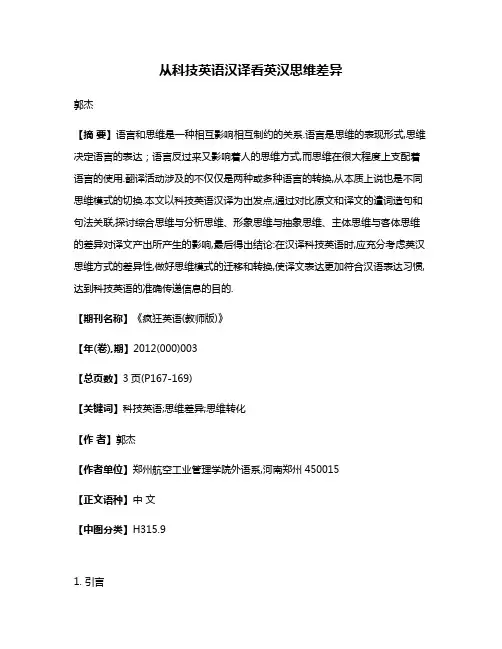
从科技英语汉译看英汉思维差异郭杰【摘要】语言和思维是一种相互影响相互制约的关系.语言是思维的表现形式,思维决定语言的表达;语言反过来又影响着人的思维方式,而思维在很大程度上支配着语言的使用.翻译活动涉及的不仅仅是两种或多种语言的转换,从本质上说也是不同思维模式的切换.本文以科技英语汉译为出发点,通过对比原文和译文的遣词造句和句法关联,探讨综合思维与分析思维、形象思维与抽象思维、主体思维与客体思维的差异对译文产出所产生的影响,最后得出结论:在汉译科技英语时,应充分考虑荚汉思维方式的差异性,做好思维模式的迁移和转换,使译文表达更加符合汉语表达习惯,达到科技英语的准确传递信息的目的.【期刊名称】《疯狂英语(教师版)》【年(卷),期】2012(000)003【总页数】3页(P167-169)【关键词】科技英语;思维差异;思维转化【作者】郭杰【作者单位】郑州航空工业管理学院外语系,河南郑州450015【正文语种】中文【中图分类】H315.91. 引言思维与语言的关系是以思维为起点的双向作用与反作用的关系。
人类在语言之前就有思维,思维是人类对客观世界由感性到理性的认识过程。
所以决定人类思维的首先是客观现实,而不是语言。
语言是思维的载体,影响着思维;思维是语言的核心,制约并支配着语言。
而传统意义上,翻译一直被认为是一种跨语言的语际转换活动,是把一种语言的言语产物在保持内容意义不变的情况下,用另一种语言来表现的过程。
实际上,翻译在本质上还是一种思维的转换活动,所以在翻译操作过程中必然可以折射出思维方式的差异性。
科技英语作为传达科技知识与信息的手段,在语言表达上具有准确性、客观性和简洁性特点,这从本质上受到思维方式的左右。
因此,在科技英语的汉译过程中必然可以反映出英汉思维的差异。
2. 综合思维与分析思维东方人偏好综合思维,西方人偏向分析思维。
前者指在思想上将各个部分联合成整体,强调对自然社会认识的整体性和统一性,在语言层面上的反映就是意合句的频繁出现。
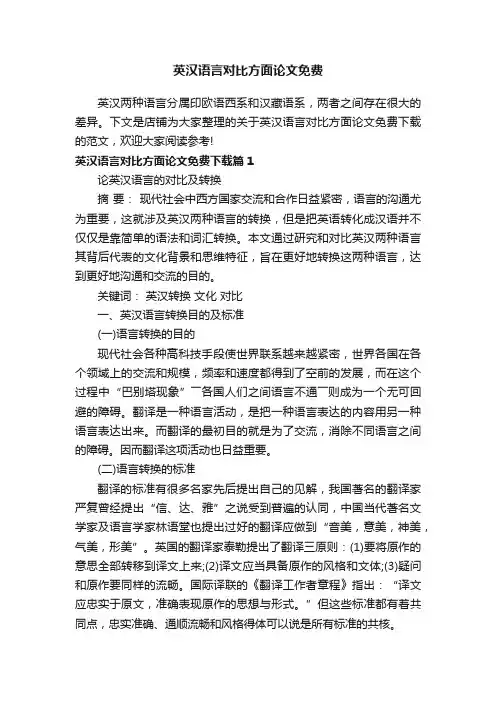
英汉语言对比方面论文免费英汉两种语言分属印欧语西系和汉藏语系,两者之间存在很大的差异。
下文是店铺为大家整理的关于英汉语言对比方面论文免费下载的范文,欢迎大家阅读参考!英汉语言对比方面论文免费下载篇1论英汉语言的对比及转换摘要:现代社会中西方国家交流和合作日益紧密,语言的沟通尤为重要,这就涉及英汉两种语言的转换,但是把英语转化成汉语并不仅仅是靠简单的语法和词汇转换。
本文通过研究和对比英汉两种语言其背后代表的文化背景和思维特征,旨在更好地转换这两种语言,达到更好地沟通和交流的目的。
关键词:英汉转换文化对比一、英汉语言转换目的及标准(一)语言转换的目的现代社会各种高科技手段使世界联系越来越紧密,世界各国在各个领域上的交流和规模,频率和速度都得到了空前的发展,而在这个过程中“巴别塔现象”――各国人们之间语言不通――则成为一个无可回避的障碍。
翻译是一种语言活动,是把一种语言表达的内容用另一种语言表达出来。
而翻译的最初目的就是为了交流,消除不同语言之间的障碍。
因而翻译这项活动也日益重要。
(二)语言转换的标准翻译的标准有很多名家先后提出自己的见解,我国著名的翻译家严复曾经提出“信、达、雅”之说受到普遍的认同,中国当代著名文学家及语言学家林语堂也提出过好的翻译应做到“音美,意美,神美,气美,形美”。
英国的翻译家泰勒提出了翻译三原则:(1)要将原作的意思全部转移到译文上来;(2)译文应当具备原作的风格和文体;(3)疑问和原作要同样的流畅。
国际译联的《翻译工作者章程》指出:“译文应忠实于原文,准确表现原作的思想与形式。
”但这些标准都有着共同点,忠实准确、通顺流畅和风格得体可以说是所有标准的共核。
二、英汉语言对比(一)主语与主题中国传统哲学主张“天人合一”,反映在语言上就是施事主体可以蕴含在行为事件的主观表现中。
因此在句子构造中,汉语并不把主语看成必要的成分,多为无主语而重主题的形式。
而英语则是注重主语的语言,造句离不开主语。
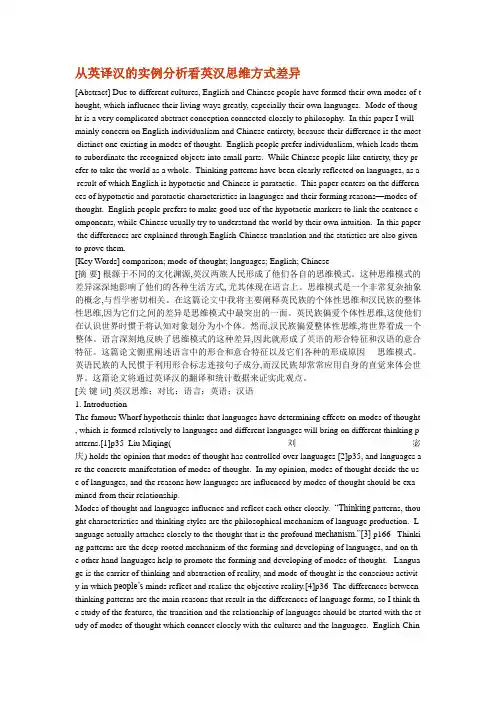
从英译汉的实例分析看英汉思维方式差异[Abstract] Due to different cultures, English and Chinese people have formed their own modes of t hought, which influence their living ways greatly, especially their own languages. Mode of thoug ht is a very complicated abstract conception connected closely to philosophy. In this paper I will mainly concern on English individualism and Chinese entirety, because their difference is the most distinct one existing in modes of thought. English people prefer individualism, which leads them to subordinate the recognized objects into small parts. While Chinese people like entirety, they pr efer to take the world as a whole. Thinking patterns have been clearly reflected on languages, as a result of which English is hypotactic and Chinese is paratactic. This paper centers on the differen ces of hypotactic and paratactic characteristics in languages and their forming reasons—modes of thought. English people prefers to make good use of the hypotactic markers to link the sentence c omponents, while Chinese usually try to understand the world by their own intuition. In this paper the differences are explained through English-Chinese translation and the statistics are also given to prove them.[Key Words] comparison; mode of thought; languages; English; Chinese[摘要] 根源于不同的文化渊源,英汉两族人民形成了他们各自的思维模式。
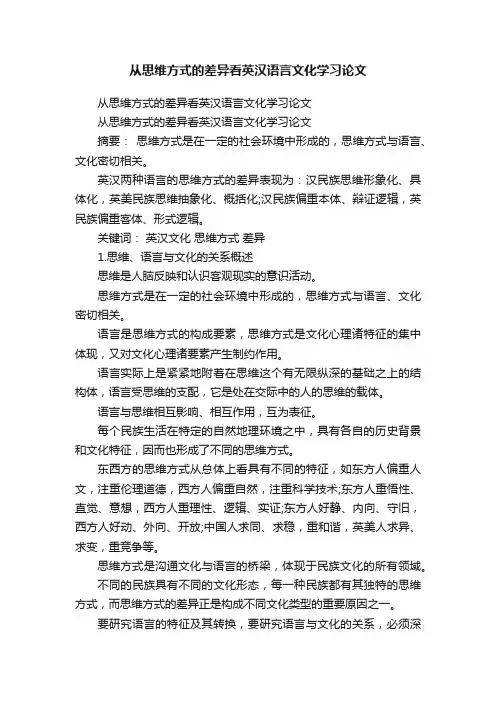
从思维方式的差异看英汉语言文化学习论文从思维方式的差异看英汉语言文化学习论文从思维方式的差异看英汉语言文化学习论文摘要:思维方式是在一定的社会环境中形成的,思维方式与语言、文化密切相关。
英汉两种语言的思维方式的差异表现为:汉民族思维形象化、具体化,英美民族思维抽象化、概括化;汉民族偏重本体、辩证逻辑,英民族偏重客体、形式逻辑。
关键词:英汉文化思维方式差异1.思维、语言与文化的关系概述思维是人脑反映和认识客观现实的意识活动。
思维方式是在一定的社会环境中形成的,思维方式与语言、文化密切相关。
语言是思维方式的构成要素,思维方式是文化心理诸特征的集中体现,又对文化心理诸要素产生制约作用。
语言实际上是紧紧地附着在思维这个有无限纵深的基础之上的结构体,语言受思维的支配,它是处在交际中的人的思维的载体。
语言与思维相互影响、相互作用,互为表征。
每个民族生活在特定的自然地理环境之中,具有各自的历史背景和文化特征,因而也形成了不同的思维方式。
东西方的思维方式从总体上看具有不同的特征,如东方人偏重人文,注重伦理道德,西方人偏重自然,注重科学技术;东方人重悟性、直觉、意想,西方人重理性、逻辑、实证;东方人好静、内向、守旧,西方人好动、外向、开放;中国人求同、求稳,重和谐,英美人求异、求变,重竞争等。
思维方式是沟通文化与语言的桥梁,体现于民族文化的所有领域。
不同的民族具有不同的文化形态,每一种民族都有其独特的思维方式,而思维方式的差异正是构成不同文化类型的重要原因之一。
要研究语言的特征及其转换,要研究语言与文化的关系,必须深入研究与语言和文化均有密切关系的思维方式。
2.英汉民族思维方式的差异2.1英民族偏重抽象思维,汉民族偏重形象思维。
英民族重抽象思维,擅长运用抽象的概念表达具体的事物,大量使用涵义概念,指称笼统的抽象名词来表达复杂的理性概念,给人一种虚、泛、曲、隐的感觉。
如:英语中有许多加虚化功能的后缀转化为抽象名词。
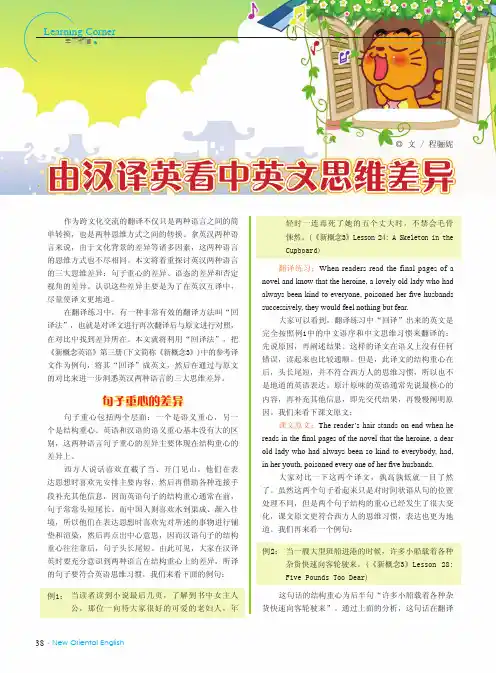
由汉译英看中英文思维差异◎ 文 / 程骊妮作为跨文化交流的翻译不仅只是两种语言之间的简单转换,也是两种思维方式之间的转换。
拿英汉两种语言来说,由于文化背景的差异等诸多因素,这两种语言的思维方式也不尽相同。
本文将着重探讨英汉两种语言的三大思维差异:句子重心的差异、语态的差异和否定视角的差异。
认识这些差异主要是为了在英汉互译中,尽量使译文更地道。
在翻译练习中,有一种非常有效的翻译方法叫“回译法”,也就是对译文进行再次翻译后与原文进行对照,在对比中找到差异所在。
本文就将利用“回译法”,把《新概念英语》第三册(下文简称《新概念3》)中的参考译文作为例句,将其“回译”成英文,然后在通过与原文的对比来进一步洞悉英汉两种语言的三大思维差异。
句子重心的差异句子重心包括两个层面:一个是语义重心,另一个是结构重心。
英语和汉语的语义重心基本没有大的区别,这两种语言句子重心的差异主要体现在结构重心的差异上。
西方人说话喜欢直截了当、开门见山,他们在表达思想时喜欢先安排主要内容,然后再借助各种连接手段补充其他信息,因而英语句子的结构重心通常在前,句子常常头短尾长。
而中国人则喜欢水到渠成、渐入佳境,所以他们在表达思想时喜欢先对所述的事物进行铺垫和渲染,然后再点出中心意思,因而汉语句子的结构重心往往靠后,句子头长尾短。
由此可见,大家在汉译英时要充分意识到两种语言在结构重心上的差异,所译的句子要符合英语思维习惯。
我们来看下面的例句:例1: 当读者读到小说最后几页,了解到书中女主人公,那位一向待大家很好的可爱的老妇人,年轻时一连毒死了她的五个丈夫时,不禁会毛骨悚然。
(《新概念3》Lesson 24: A Skeleton in theCupboard)翻译练习:When readers read the final pages of a novel and know that the heroine, a lovely old lady who had always been kind to everyone, poisoned her fi ve husbands successively, they would feel nothing but fear.大家可以看到,翻译练习中“回译”出来的英文是完全按照例1中的中文语序和中文思维习惯来翻译的:先说原因,再阐述结果。
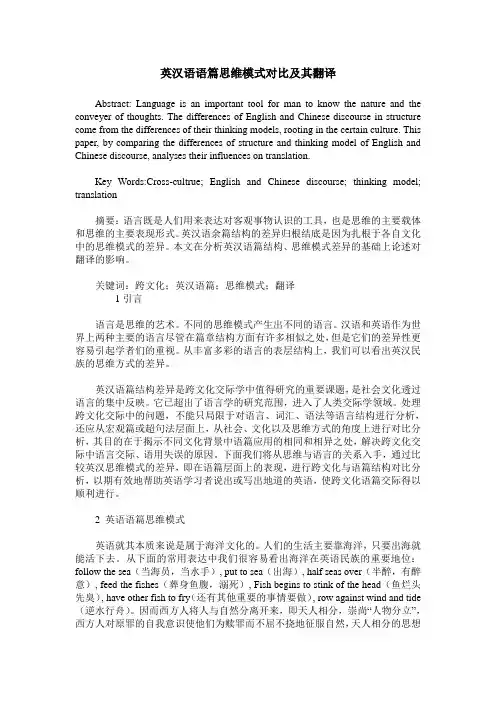
英汉语语篇思维模式对比及其翻译Abstract: Language is an important tool for man to know the nature and the conveyer of thoughts. The differences of English and Chinese discourse in structure come from the differences of their thinking models, rooting in the certain culture. This paper, by comparing the differences of structure and thinking model of English and Chinese discourse, analyses their influences on translation.Key Words:Cross-cultrue; English and Chinese discourse; thinking model; translation摘要:语言既是人们用来表达对客观事物认识的工具,也是思维的主要载体和思维的主要表现形式。
英汉语余篇结构的差异归根结底是因为扎根于各自文化中的思维模式的差异。
本文在分析英汉语篇结构、思维模式差异的基础上论述对翻译的影响。
关键词:跨文化;英汉语篇;思维模式;翻译1引言语言是思维的艺术。
不同的思维模式产生出不同的语言。
汉语和英语作为世界上两种主要的语言尽管在篇章结构方面有许多相似之处,但是它们的差异性更容易引起学者们的重视。
从丰富多彩的语言的表层结构上,我们可以看出英汉民族的思维方式的差异。
英汉语篇结构差异是跨文化交际学中值得研究的重要课题,是社会文化透过语言的集中反映。
它已超出了语言学的研究范围,进入了人类交际学领域。
处理跨文化交际中的问题,不能只局限于对语言、词汇、语法等语言结构进行分析,还应从宏观篇或超句法层面上,从社会、文化以及思维方式的角度上进行对比分析,其目的在于揭示不同文化背景中语篇应用的相同和相异之处,解决跨文化交际中语言交际、语用失误的原因。
校园英语 /从中英思维差异视角分析中英互译核心思维海口经济学院外国语学院公共外语教学部/夏海玲 刘文文【摘要】正确的思维对正确的语言表达具有至关重要的决定性意义。
本文主要是笔者在日积月累的教学反思中,总结出的具有普遍性和概括性的理论研究结果。
本文试图提炼出中英思维的核心差异,并将其运用到大学公共英语翻译教学实践中。
【关键词】中英思维差异 翻译技巧 教学实践【Abstract】This paper,first,examines the commonly-seen poor expressions of English learners in China due to the ill-equipped knowledge of thinking style.Then,it deals with the key differences of thinking between Chinese and English-speaking countries.In the third part,some translation strategies are recommended,accordingly,to help improve the teaching and learning practice.【Keywords】Differences of Thinking;Translation Tactics; Teaching and Learning Practice中国英语学习者容易常犯的英语表达错误主要有:语序混乱,词性混淆,词语搭配不当,主谓逻辑不一致,第一人称的滥用,状语与要修饰的动作位置颠倒等等。
若淡去语言基础薄弱,语音不准,词汇量不足,语法理解力差,语言学习条件欠佳等个人动机方面的原因之外,我们不可否认的一个深层次的原因就是中英思维差异之大。
这常常使中国英语学习者望文生畏,裹足不前。
一、中英思维之核心差异英语思维是重理性、讲科学的思维,其逻辑缜密,句子结构紧凑。
[英汉语言对比]英汉语言对比论文篇一: 英汉语言对比论文英汉句法现象对比研究与翻译摘要:英汉两种语言在句法结构方面有很大的差异,其中英汉句法差异是英汉翻译的难点之一,也是影响翻译水平的重要因素之一。
本文将通过对英语和汉语两种不同语言的句法现象进行对比分析,来探索翻译的技巧。
关键词:英语汉语句法现象翻译A Contrastive Study of English and Chinese Syntax structure and Translation Abstract: English and Chinese possess so many differences in syntax structure, which is one of the difficulties in translation, as well as one of the factors affecting translation quality. The paper makes a comparison of two kinds of syntax structures, in order to seek better ways in translation.Key Words: English; Chinese; syntax structure; contrastive study; translation 0. 引言语言本身是一种文化现象,它既是文化的载体,又受到文化的影响和制约。
汉语和英语是世界上的两大语言,各代表着东西方的两种文化。
由于受到汉语负迁移的影响,运用英语进行表达时,虽然语法和词汇用对,但常出现一些不符合英语表达习惯的句子,主要是英汉句法结构不同表达的语用失误。
因为英语和汉语在很多方面完全不同,中国语言学家喜欢按照文化背景差异分析两者的不同。
中国学者陆国强教授写的关于英语和汉语的《语义结构对比分析》一书,从语义方面比较英语和汉语。
中西思维方式差异英语作文The difference between Eastern and Western ways of thinking is a topic that has been studied and debated for centuries. It is a complex and multifaceted issue that encompasses cultural, philosophical, and psychological differences. In this essay, I will explore the various ways in which Eastern and Western thinking differ, and how these differences can impact communication, problem-solving, and decision-making.One of the most fundamental differences between Eastern and Western thinking is the emphasis on individualism versus collectivism. In Western cultures, there is a strong emphasis on individual rights, freedoms, and personal achievement. This can lead to a more competitive and assertive approach to problem-solving and decision-making. In contrast, Eastern cultures tend to prioritize the needs of the group over the individual, and place a greater emphasis on harmony, cooperation, and consensus-building. This can lead to a more collaborative and inclusiveapproach to problem-solving and decision-making.Another key difference between Eastern and Western thinking is the concept of time. In Western cultures, time is often seen as a limited resource that must be managed and optimized. This can lead to a focus on efficiency, productivity, and long-term planning. In contrast, Eastern cultures often have a more fluid and flexible approach to time, and may prioritize the present moment over long-term goals. This can impact communication and decision-making, as Westerners may be more focused on deadlines and schedules, while Easterners may be more focused on relationships and the immediate context.Additionally, Eastern and Western thinking differ in their approach to communication and conflict resolution. In Western cultures, there is a strong emphasis on direct and explicit communication, and a preference for confrontation and debate in resolving conflicts. This can lead to a more confrontational and assertive communication style. In contrast, Eastern cultures often value indirect andimplicit communication, and may prioritize harmony andavoiding conflict. This can lead to a more diplomatic and indirect communication style.Furthermore, the concept of self and identity differs between Eastern and Western cultures. In Western cultures, there is an emphasis on individualism and self-expression, and a belief in the ability to shape one's own destiny. This can lead to a strong sense of personal agency and responsibility. In contrast, Eastern cultures often prioritize the interconnectedness of all things, and may have a more fluid and flexible sense of self. This can impact how individuals perceive their role in society and their relationships with others.Moreover, the role of tradition and innovation varies between Eastern and Western thinking. In Western cultures, there is often a strong emphasis on progress, innovation, and change. This can lead to a focus on individualcreativity and the pursuit of new ideas. In contrast, Eastern cultures often have a deep respect for tradition and a more conservative approach to change. This can impact how individuals approach problem-solving and decision-making, as Westerners may be more open to new ideas and approaches, while Easterners may be more inclined to rely on established practices and wisdom.In conclusion, the differences between Eastern and Western ways of thinking are complex and multifaceted, encompassing cultural, philosophical, and psychological dimensions. These differences can impact communication, problem-solving, and decision-making in profound ways, and it is important for individuals from both cultures to be aware of and sensitive to these differences in order to effectively navigate a globalized world.。
中英思维差异英文作文英文回答,。
The Chinese and English languages have distinctlinguistic characteristics that shape the way theirspeakers think and communicate. The most notable difference between the two languages is their grammatical structure. Chinese is an isolating language, meaning that words arenot connected by grammar, while English is an inflectional language, meaning that words are changed to express grammar. This difference leads to different ways of expressing relationships between words in sentences. In Chinese, the order of words is crucial, while in English, the order of words is more flexible. 。
Another difference between the two languages is their use of context. Chinese relies heavily on context to convey meaning, while English relies more on explicit grammar rules. This means that Chinese speakers are more likely to rely on the situation and the surrounding text tounderstand the meaning of a sentence, while English speakers are more likely to rely on the grammar of the sentence itself.These linguistic differences have a profound effect on the way that Chinese and English speakers think about the world. Chinese speakers tend to think in a holistic way, considering the big picture and the relationships between different parts of a situation. English speakers, on the other hand, tend to think in a more analytical way, focusing on the details and the individual parts of a situation. 。
从英汉文化的差异简析英语习语翻译英语毕业论文(1)随着全球化的进程,英语已成为世界上最为广泛使用的语言之一,这意味着英语翻译的重要性也越来越受到重视。
在英语翻译中,习语的翻译是一个极具挑战性的任务。
因为不同国家和地区文化的差异,经常会导致英汉习语之间的巨大差异。
因此,在英语毕业论文中通过简析英汉文化的差异来探讨英语习语翻译的方法是一种非常有意义的研究。
一、英汉语言文化差异英汉语言文化差异是导致英语习语翻译中困难的主要原因之一。
英语是西方的语言,有着严密的语法结构,在表述时讲究简洁、明确,而汉语则是东方的语言,更注重意境、寓意,常常运用比喻和象征来表达思想。
二、英语习语翻译难点英语习语是英语中的一个重要部分,也是翻译工作中比较难翻译的内容。
根据含义和表达方式的差异,英汉习语的翻译难点主要体现在以下几个方面:1. 文化差异英汉习语的本质差异,在于它们来源于不同的文化背景,文化取向和民族思维方式。
因此,在翻译时,必须对两种文化背景下的习惯表达进行充分理解和分析,才能准确地诠释它们所蕴含的意义。
2. 语法差异英汉语言在语法结构上有很大区别,英语主谓宾定序,而汉语则是主谓宾序列。
这种语法上的区别会导致英语习语在构成上和表现方式上有不同,这对翻译工作者的语法功底和语感都提出了更高的要求。
3. 疑惑口误习语在英汉语言中都非常常见,但它们含义和表达方式的疑惑与口误也难以避免。
在英语习语中可能会存在口误或错误的理解,这就要求翻译人员具有较高的语言和文化敏感度,并且要熟悉一些相关的礼仪语言和表达法。
三、克服方法1. 调整表达方式在翻译过程中,由于语言和文化的差异,中英文习语的表达方式往往存在很大区别,因此需要根据中英文间表达内容的差异与语气上的不同,适当调整表达方式。
具体的方法是,要将英汉习语进行功能、时态、语气等几个方面的对比,然后通过对照各自的语言风格和文化传统,进行充分的思考和揣摩。
2. 实现中立翻译要实现中立翻译,需要翻译人员熟悉两种语言和文化的特色和表达方式,充分理解其差异和相似之处,可以采用逐字翻译、词组翻译和分步分解翻译等方法,以保证即使在意识差异处也可以实现准确的翻译。
从英译汉的实例分析看英汉思维方式差异[Abstract] Due to different cultures, English and Chinese people have formed their own modes of t hought, which influence their living ways greatly, especially their own languages. Mode of thoug ht is a very complicated abstract conception connected closely to philosophy. In this paper I will mainly concern on English individualism and Chinese entirety, because their difference is the most distinct one existing in modes of thought. English people prefer individualism, which leads them to subordinate the recognized objects into small parts. While Chinese people like entirety, they pr efer to take the world as a whole. Thinking patterns have been clearly reflected on languages, as a result of which English is hypotactic and Chinese is paratactic. This paper centers on the differen ces of hypotactic and paratactic characteristics in languages and their forming reasons—modes of thought. English people prefers to make good use of the hypotactic markers to link the sentence c omponents, while Chinese usually try to understand the world by their own intuition. In this paper the differences are explained through English-Chinese translation and the statistics are also given to prove them.[Key Words] comparison; mode of thought; languages; English; Chinese[摘要] 根源于不同的文化渊源,英汉两族人民形成了他们各自的思维模式。
这种思维模式的差异深深地影响了他们的各种生活方式, 尤其体现在语言上。
思维模式是一个非常复杂抽象的概念,与哲学密切相关。
在这篇论文中我将主要阐释英民族的个体性思维和汉民族的整体性思维,因为它们之间的差异是思维模式中最突出的一面。
英民族偏爱个体性思维,这使他们在认识世界时惯于将认知对象划分为小个体。
然而,汉民族偏爱整体性思维,将世界看成一个整体。
语言深刻地反映了思维模式的这种差异,因此就形成了英语的形合特征和汉语的意合特征。
这篇论文侧重阐述语言中的形合和意合特征以及它们各种的形成原因----思维模式。
英语民族的人民惯于利用形合标志连接句子成分,而汉民族却常常应用自身的直觉来体会世界。
这篇论文将通过英译汉的翻译和统计数据来证实此观点。
[关键词] 英汉思维;对比;语言;英语;汉语1. IntroductionThe famous Whorf hypothesis thinks that languages have determining effects on modes of thought , which is formed relatively to languages and different languages will bring on different thinking p atterns.[1]p35 Liu Miqing(刘宓庆) holds the opinion that modes of thought has controlled over languages [2]p35, and languages a re the concrete manifestation of modes of thought. In my opinion, modes of thought decide the us e of languages, and the reasons how languages are influenced by modes of thought should be exa mined from their relationship.Modes of thought and languages influence and reflect each other closely. “Thinking patterns, thou ght characteristics and thinking styles are the philosophical mechanism of language production. L anguage actually attaches closely to the thought that is the profound mechanism.”[3] p166 Thinki ng patterns are the deep-rooted mechanism of the forming and developing of languages, and on th e other hand languages help to promote the forming and developing of modes of thought. Langua ge is the carrier of thinking and abstraction of reality, and mode of thought is the conscious activit y in which people’s minds reflect and realize the objective reality.[4]p36 The differences between thinking patterns are the main reasons that result in the differences of language forms, so I think th e study of the features, the transition and the relationship of languages should be started with the st udy of modes of thought which connect closely with the cultures and the languages. English-Chinese modes of thought have their own characteristics in thinking core, thinking pattern, cognition h abits and thinking principles. As a tool for communication the basic attribute of English and Chin ese are the same, so there are many similarities during the description and thinking with the two la nguages. But because of the influence of their own cultures, there are many differences between t he two languages, and based on different comparison foundation there are many different kinds of results.In this paper English-Chinese translation will be given and analyzed in details in order to understa nd the differences of the modes of thought between English and Chinese through their language m anifestations. Statistics will be given to explain the differences of English and Chinese, which is t he foundation for my analyzing of the differences of their own thinking patterns. As we know, the re are many differences between the two languages, such as hypotaxis and parataxis, passive and a ctive, static and dynamic, imperson and person. But in this passage, I will only mainly discuss fro m one point which is hypotaxis and parataxis. As Nida states in his book that study from linguisti cs, the most important different characteristic between Chinese and English is the difference of par ataxis and hypotaxis.[5]P13 LiuMiqing holds the opinion that hypotaxis and parataxis are the “uni que characteristic” for English and Chinese.[6]P13 The comparison of the difference will be desc ribed through statistical description and the deep-rooted reasons of thinking patterns will also be gi ven to explain the forming of the language difference.2. The example of the English to Chinese translation2.1 English originalWe know that clean energy technologies have great appeal to the developing world beyond the val ue we in the developed world attach to their capacity to limit climate change. Africa, for example, barely accounts for 1% of global greenhouse gas emissions. It’s not surprising then that our partn ers on this continent are more concerned with the development potential of sustainable energy. Th e price volatility of Africa’s hydrocarbon imports has played havoc with each state’s economy ove r recent decades and stymied progress. REEEP (Renewable Energy and Energy Efficiency Partne rship)’s support for proven renewable technologies, such as solar water heating and co-generation ---which of course rely on local products which don’t need to be imported---will greatly increase t he reliability of Africa’s energy supply, and thereby help spur development.The creating of a more even distribution of energy supply will, in turn, fuel new employment and commercial opportunities, particularly in rural areas. Renewable sources then will help to address the social inequality across the globe that we see in the currently marked and unacceptable differe nce between rich and poor nations in terms of access to and use of energy supplies. [7]P2692.2 The Chinese translation清洁性能源技术因为能够缓解气候变化而受到我们发达国家的青睐。